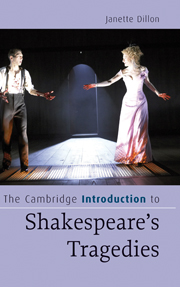Book contents
- Frontmatter
- Contents
- Acknowledgements
- Introduction
- Chapter 1 Tragedy before Shakespeare
- Chapter 2 Titus Andronicus
- Chapter 3 Romeo and Juliet
- Chapter 4 Julius Caesar
- Chapter 5 Hamlet
- Chapter 6 Othello
- Chapter 7 Timon of Athens
- Chapter 8 King Lear
- Chapter 9 Macbeth
- Chapter 10 Antony and Cleopatra
- Chapter 11 Coriolanus
- Notes
- Index
Chapter 8 - King Lear
Published online by Cambridge University Press: 05 August 2015
- Frontmatter
- Contents
- Acknowledgements
- Introduction
- Chapter 1 Tragedy before Shakespeare
- Chapter 2 Titus Andronicus
- Chapter 3 Romeo and Juliet
- Chapter 4 Julius Caesar
- Chapter 5 Hamlet
- Chapter 6 Othello
- Chapter 7 Timon of Athens
- Chapter 8 King Lear
- Chapter 9 Macbeth
- Chapter 10 Antony and Cleopatra
- Chapter 11 Coriolanus
- Notes
- Index
Summary
King Lear survives in two versions. These are sufficiently different from one another to have persuaded several recent editors to print them independently rather than to draw on both to produce a conflated text, as has been common practice in editing Shakespeare's plays generally. The title page of the 1608 Quarto printing tells us that the play was performed ‘before the King's majesty at Whitehall upon St Stephen's night in Christmas holidays’, and stationers’ records confirm the date of this performance as 26 December 1606. Some version of the play, therefore was complete by late 1606, but how far that version may have corresponded to either of the extant printed texts remains a matter for debate. I have chosen to follow the Quarto text here, in the probability that more of its text represents the earliest version of the play, which is the version that would place it at this point in the chronology of Shakespeare's tragedy, close to Timon. But even this argument is open to doubt. The play may have been subject to both revision and censorship, and it is likely that no single text simultaneously comes closest to what was first written and what was first performed. What Shakespeare first wrote may have been revised by him, on aesthetic or theatrical grounds, but may equally have been revised or censored by others for printing or performance on political grounds; and the Folio, despite being printed so much later than the Quarto, may yet record elements of an earlier text than appears in the Quarto.
Unclear as the textual circumstances are, what emerges from them is a political play performed in a politically sensitive environment, before King James and the court, by the company which the King had honoured with his name.
Information
- Type
- Chapter
- Information
- The Cambridge Introduction to Shakespeare's Tragedies , pp. 103 - 113Publisher: Cambridge University PressPrint publication year: 2007
